| |
During
her long reign, Shake-speare showed no interest in founding British
colonies
in the New World. All colonizing attempts were made by Christians
like
Sir Francis Drake, Sir Walter Raleigh, and Captain John Smith.
|
|
On his around
the world voyage in 1578, devout Christian Sir Francis
Drake claimed the Pacific Northwest for Queen Elizabeth I and called
it New Albion or New England.
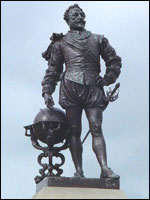
Statue of Sir Francis Drake in Plymouth, England.
|
| |
In
1578, Sir Francis Drake
claimed the Pacific Northwest for Queen Elizabeth I and
called it New Albion or New England.
He
left 20 men behind to found a colony and search for the
Northwest Passage.
In
1607, Captain John Smith founded a colony in Jamestown,
Virginia.
|
|
|
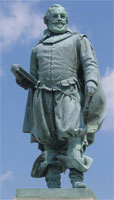
Statue of Captain John Smith
in Jamestown, Virginia. |
When
Francis Drake arrived back in England with a vast treasure, he was knighted
by Shake-speare
in 1581. Her husband, Sir Robert Dudley, showed no interest in reinforcing
the colony in California. Soon afterward, the country was convulsed
by the "Invincible" Spanish Armada and that golden opportunity
was lost forever.
In
April 1607, Captain John Smith founded the first successful
overseas British colony, and that colony, along with Plymouth, Massachusetts,
became the genesis of the United States.
Hundreds
of books have been written on the life and times of Sir Francis
Drake, but little is known of the other great Hero: Captain John
Smith.
John
Smith began his career as a soldier at the young age of 17.
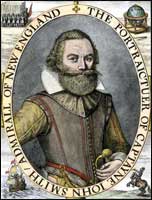
Captain John Smith
(1580–1631).
|
| |
As
an orphaned teenager, Smith joined the British army in
France, fighting against the Spanish for the liberation
of Heroic Holland.
Later,
he joined the Hungarians fighting against the Muslim Turks.
|
|
|
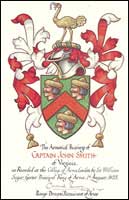
Smith's coat of arms showing
the heads of 3 Turks.
|
Challenged
to a duel by 3 Turks, he beheaded all 3 of them, and was rewarded
with a special coat of arms by Szigmond Báthory.
Smith
was victorious in a David versus Goliath type duel with 3 Turks.
He beheaded all 3 of them, and for his valor he was given the title
"Captain" and a special coat of arms showing the heads
of 3 Turks.
While
besieging a castle in Transylvania, the Turks issued a challenge to
single combat. John Smith's name was drawn by lot and he accepted the
challenge.
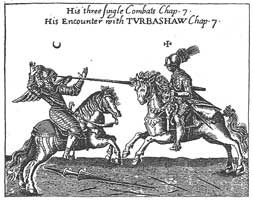
Captain Smith
killing a Terrible Turk
in single combat.
|
| |
While
besieging a city in Transylvania, the Terrible Turks issued
a challenge to meet an opponent in single combat.
Smith
was chosen to accept the challenge and he killed 3 Terrible
Turks.
Our
Hero was mighty with the pen ... and the SWORD!
|
|
|
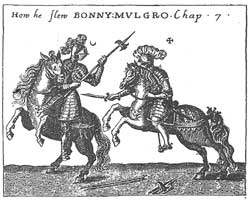
Captain Smith killing another
Terrible Turk.
|
During
a subsequent battle with the Turks, Smith was wounded and left for
dead. One of the Turks saw his splendid armor and decided he would
be worth more dead than alive.
Smith
was taken captive and sold as a slave to a lady in Constantinople.
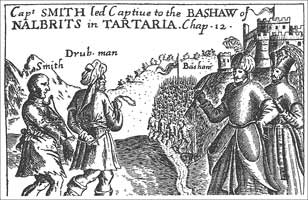
Captain
Smith was sold as a slave
and ended up in Constantinople. |
| |
John
Smith was wounded and left for dead after a battle with
the Turks.
Most
of the wounded were killed and beheaded but Smith was spared
and sold as a slave to a lady in Constantinople.
|
|
|
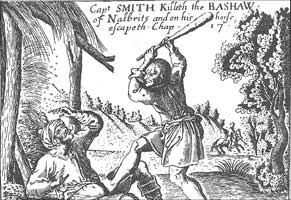
Smith killed
his Terrible Turkish taskmaster
and escaped to Russia. |
Later,
he was sent to her brother who treated him like a beast.
Smith
was treated worse that a beast by his cruel Turkish taskmaster.
When the opportunity arose, he killed the Turk, borrowed his horse,
and escaped to freedom in Russia.
The
brave Captain eventually found his way back to London and began
working with the Reverend Richard Hakluyt and the Reverend Samuel
Purchas for the colonization and evangelization of the New World.
Captain
Smith sailed for the New World in 1606
In
December 1606, 3 ships, the Susan Constant, the Godspeed
and the Discovery, left London, England, bound for the
New World. Smith sailed on the Susan Constant with the
seasick chaplain, Reverend Robert Hunt.
Their
destination was the eastern shore of the New World called Virginia.
The Spanish watched the voyage very carefully because all of them
were in violation of the Bull of Pope Alexander VI.
On
board the Susan Constant with Smith was a man named Edward
Maria Wingfield. Wingfield had an inveterate HATRED for Captain
Smith and wanted to see him hanging from a rope at the very first
opportunity.
Wingfield
erected a gallows on the island of Nevis in the West Indies, but Smith
was miraculously saved by the chaplain, Reverend Robert Hunt.
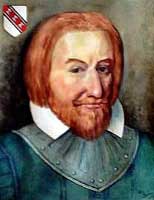
Edward Maria Wingfield
(1550–1631). |
| |
Wingfield
was a Latin Church aristocrat whose grandmother, Lady Wingfield,
was lady in waiting to Queen Anne Boleyn.
Captain
Smith was the special focus of his hatred, and he tried
to have the Captain HUNG for mutiny . . . before
they even reached Virginia!
Christ
was with the Captain however . . . and foiled all the plans
of Wingfield! |
|
|
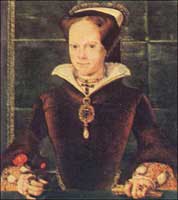
The Maria came from
Bloody Mary Tudor. |
Wingfield was
named Maria after the Princess Mary, later to become known
in history as Bloody Mary because of her merciless persecution of
Christians.
His "godfather"
was Cardinal Pole . . . who almost became the second English
Pope.
The
Wingfields were fanatical Latin Church aristocrats . . . fighting
desperately to restore Papal supremacy in England....Here is
a quote from a book by a descendant of Wingfield who claimed
that Wingfield was the founder of the colony:
Mary,
the catholic daughter of Henry VIII and Catherine of Aragon,
however, raised her standard at Framlingham Castle, Suffolk,
the big fortress of the Duke of Norfolk, (which had reverted
to the Crown since Norfolk was in the Tower), just four or five
miles from Letheringham Hall, seat of the head of Edward-Maria's
family. One must remember that Mary had
lost her mother Queen Catherine of Aragon in the Wingfield's
other home, Kimbolton Castle. The East Anglians—landowners
and all—flocked to Framlingham. In the van were Sir William
Drury of Hawstead and his son, Robert, followed two days later,
no doubt after very careful consideration, by Robert, Anthony
and Henry Wingfield, three of the sons of the late Sir Anthony
Wingfield, K.G. of Letheringham, and Robert Wingfield, son of
the late Sir Humphrey Wingfield of Brantham near Ipswich. Stonely
in those days was not even considered to be on the borders of
East Anglia. The father of the infant Edward Maria did not heed
Mary's call. It looks as if his ardour for the catholic faith
had cooled some fifteen years previously, but it was not the
return of the old faith that drew these men, but their determination
to see a fair succession. The chaotic time of the Wars of the
Roses had not been forgotten.
Mary personally released Bishop Gardiner and the Duke of Norfolk
and two others from the Tower the moment she arrived in London,
en route to be crowned: "These be my prisoners," she
said, kissing them. At the Tower at her
coronation, the new Queen knighted two of Thomas-Maria's cousins,
the two Robert Wingfields of Letheringham and of Upton, but
not Thomas-Maria Wingfield himself. (Wingfield, Virginia's
True Founder, p. 17).
After a tumultuous
voyage, the first landing was made on April 26, 1607.
First
Landing was on April 26, 1607
The first
landing was on April 26, 1607. Reverend Hunt led a long prayer
dedicating the New World to God and the furtherance of the Gospel
of Jesus Christ.
During
this time, Captain Smith was still a prisoner on the Susan
Constant and Wingfield was still determined to see him hang.
Imagine his consternation when a sealed box was opened and Captain
Smith was named as one of seven governors of the colony:
Inside the
box was a list of the seven men who would govern as members
of the colony's ruling council. Most of the names were predictable:
Edward-Maria Wingfield, the investor; Christopher Newport, who
had commanded the Susan Constant; Bartholomew Gosnold,
who had instigated the creation of the Virginia Company and
who was in charge of the Godspeed; and John Ratcliffe
of the Discovery. Also unsurprising were the names
of two well-connected colonists: George Kendall was a protégé
of secretary of state Sir Robert Cecil, the earl of Salisbury,
a Virginia Company leader and major investor; John Martin was
the son of Sir Richard Martin, master of the mint and Lord Mayor
of London, and a brother-in-law of Sir Julius Caesar, master
of the rolls.
The remaining name, however, must have caused some faces to
darken, and some Anglo-Saxon expletives to reverberate against
the walls, when the captains relayed the list to the other gentlemen
of the journey. The name was that of John
Smith, the riffraff who addressed these Cambridge and
Inns of Court graduates as if he were their equal, if not their
superior. He was still a prisoner on the ship for plotting insurrection
in the West Indies. For the time being, that is where he would
stay; the news of his appointment to the council was not enough
to set him free—not yet. (Price, Love and Hate in
Jamestown, pp. 30-31).
As one of the
governors of the colony, Smith was saved from hanging and escaped
from the clutches of Wingfield . . . for now!!
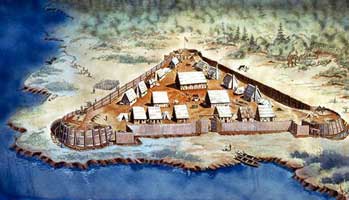
The Jamestown
Colony in Virginia. |
| |
The
New World was Satan's playground for thousands of years
and the Spanish wanted to keep it that way!
The
Evil One was horrified when a small group of Christians
gained a beachhead on his territory.
|
|
|
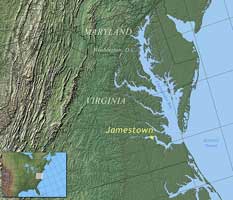
Map of the Jamestown Colony. |
As predicted,
all HELL broke lose, and the survival of the colony was nothing
short of miraculous!
The colonists were a real combination of TARES and
WHEAT. Some of them dreamed of finding GOLD and getting rich quick.
Some of them were ARISTOCRATS who despised manual labor....Wingfield
and his followers were planted by the Jesuits to sow dissension
and disease . . . and cause conflict with the natives.
Captain
Smith and Reverend Hunt were primarily interested in the spread
of true Christianity among the natives:
So then here is a place a nurse for souldiers,
a practise for marriners, a trade for marchants, a reward for
the good, and that which is most of all, a businesse (most acceptable
to God) to bring such poore infidels to
the true knowledge of God and his holy Gospell. (Barbour,
Complete Works of Captain John Smith, vol. I, p. 59).
Captain
Smith had many narrow escapes from death in the New World.
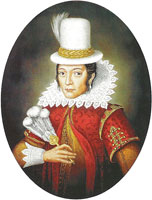
Pocahontas
(c. 1595–1631). |
| |
Because
he came to the New World to serve Christ and not GOLD, Elohim
miraculously saved the life of Captain Smith several times.
On
one occasion, a young Indian maiden named Pocahontas saved
him from certain death at the hands of her father, Powhatan.
|
|
|
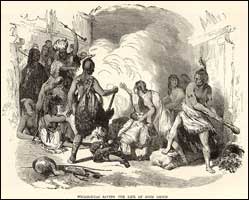
Pocahontas
saved Captain Smith
from certain death. |
After
surviving numerous murder plots, Captain Smith was sleeping on a
boat when his powder satchel was deliberately ignited. This caused
him tremendous suffering and disability which forced him to return
to England in 1609:
Smith
started downriver a second time with his men, and stretched out
for a doze during the seventy-four-mile trip. At some point, a
spark or a cinder from someone's pipe or musket matchcord went
astray and landed badly: Smith had lain
down still wearing his powder bag, which was ignited into a flash
of searing heat. The flame, wrote several colonists, "tore
the flesh from his body and thighes, nine or ten inches square
in a most pitifull manner; but to quench the tormenting fire he
leaped over-boord into the deepe river." He was nearly drowned
before his men could pull him out.
This time, there was no doctor on board to treat him. His men
rushed him back to the fort, where he was carried to his quarters.
There was no doctor at the fort, either. Dr. Walter Russell, credited
with saving him from the stingray's poison a little more than
a year earlier, was no longer on the scene, nor was the colony's
other doctor, Anthony Bagnall. (They may have been part of the
group dispersed to Nansemond). Smith was unable to stand, and
was helpless against his excruciating pain, which had rendered
him "neere bereft of his senses." In that state, he
either saw or imagined he saw a man with a pistol who had been
sent to finish him off. The assassin (or phantasm of Smith's mind)
took pity on his intended victim, however, and stopped short of
firing on him. (Price, Love and Hate in Jamestown,
p. 120).
Life in the New World
was very, very dangerous because the Spanish were determined to kill all
the colonists.
Captain
Smith went to the real Promised Land of Heaven in 1631
Captain
Smith never married for his REAL WIFE and the love of his life was
the New World....After his recuperation in London, he tried several
times to return to Virginia but was always refused.
In
1614, Smith returned to the New World in a voyage to the coasts
of Maine and Massachusetts Bay, and named the region "New England".
He made two attempts in 1614 and 1615 to return to the same coast.
The first ended when a storm dismasted his ship, the second when
he was captured by French pirates off the Azores. Smith escaped
after weeks of captivity and made his way back to England, where
he published an account of his two voyages as A Description
of New England. He never left England again, and spent the
rest of his life writing books. He died in the year 1631 in London
at the age of 51.
Smith was a
devout Christian for most of his life and his defying of the Bull
of Pope Alexander VI caused him tremendous suffering and pain .
. . and a untimely death. Here is an excerpt from his last will
and testament:
In
the name of God Amen: The one and twentith daie of June 163I in
the seaventh yere of the reigne of our soveraigne lord Charles
by the grace of God King of England Scotland france and Ireland
defendour of the faith etc. Captain John Smith of the parish of
St Sepulchers London Esquiour being sick in body, but of perfect
mynd an memory, thants be given unto Allmightie God therfore,
Revoking all former Wills by me heretofore made, do make and ordeine
this my last will and testament in manner following.
first I commend my soule into the hands of Allmightie God my maker,
hoping through the merits of Christ Jesus my Redeemer to receave
full remission of all my sinnes, and to inherit a place in the
everlasting kingdom. My body I committ to the earth from
whence it came to be interred according to the discrecion of myne
Executours hereunder named. (Barbour, Complete
Works of Captain John Smith, vol. III, p. 382).
The
Pilgrim Fathers followed in the footsteps of Captain John Smith!!
The
United States has 2 foundations: the first was Jamestown, Virginia,
and the second was Plymouth, Massachusetts.
Originally,
all the northern part of the New World to the Pacific Ocean was named
Virginia. Captain Smith renamed the northern part of Virginia, New England,
and in his writings he constantly encouraged its colonization.
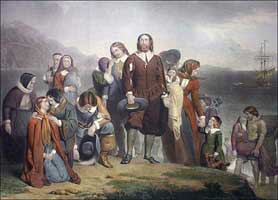
Pilgrims
landing at Plymouth Rock
in New England. |
| |
The
area where the Pilgrims landed in 1620 was called New
England by Captain John Smith.
This
was the second foundation of the British Empire in the New
World. |
|
|
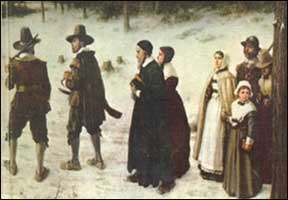
Pilgrims
on the way to church to
observe the Sabbath. |
The
Pilgrims Fathers lived in Holland for 10 years before departing
for New England.
A
dispute over the Sabbath led to the rebirth of Israel in the wilderness!!
Incredible as it may seem, it was a dispute over the proper way
to observe the Sabbath that
led the Pilgrims to leave England . . . and then Holland. This is
a true version of history that the Vatican never wants you to find
out!
King
James had just published his Book of Sports allowing games on the Christian
holy day.
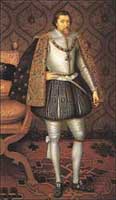
King James I (1567–1625).
King from 1603 to 1625. |
| |
King
James I published his Book of Sports in 1617. It
listed various sports that were permitted on the Christian
Sabbath.
The
Book of Sports was reissued by King Charles I in
1633.
|
|
|
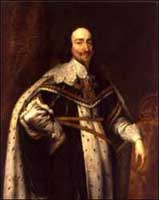
King Charles I (1600–1649).
King from 1625 to 1649. |
This
was more than the devout Christians could bear because the Sabbath
was kept holy during the reign of Queen Elizabeth I.
The
king demanded that the book be read in all the churches of his realm.
Many who refused were imprisoned or forced to leave the country:
Our
expresse pleasure therefore is, that the lawes of Our Kingdome,
and Canons of Our Church be as well observed in that Countie,
as in all other places of this Our Kingdome. And on the other
part, that no lawfull Recreation shall bee barred to Our good
People, which shall not tend to the breach of our aforesayd Lawes,
and Canons of our Church: which, to expresse more particularly,
Our pleasure is, That the Bishop, and all other inferiour Churchmen,
and Churchwardens, shall, for their parts, bee carefull and diligent,
both to instruct the ignorant, and convince and reforme them that
are misled in Religion, presenting them that will not conform
themselves, but obstinately stand out, to our judges and justices,
Whom We likewise command to put the Law in due execution against
them.
Our pleasure therefore is, That the Bishop of that Diocesse take
the like straight order with all the Puritanes and Precisians
within the same, either constraining them
to conform themselves, or to leave the County according to the
Lawes of Our Kingdome, and Canons of our Church, and so
to strike equally on both hands, against the contemners of our
Authority, and adversaries of Our Church. And as for Our good
people's lawfull Recreation, Our pleasure likewise is, That, after
the end of Divine Service, Our good people be not disturbed, letted,
or discouraged from any lawfull recreation, Such as dancing, either
of men or women, Archery for men, leaping, vaulting, or any other
such harmlesse Recreation, nor from having of May Games, Whitson
Ales, and Morris-dances, and the setting up of Maypoles, and other
sports therewith used, so as the same be had in due and convenient
time, without impediment or neglect of Divine Service: And that
women shall have leave to carry rushes to the Church for the decoring
of it, according to their old custome. But withall we doe here
account still as prohibited all unlawfull games to bee used upon
Sundayes onely, as Beare and Bullbaitings, Interludes, and at
all times, in the meaner sort of people, by Law prohibited, Bowling:
And likewise we barre from this benefite and liberty, all such
knowne Recusants, either men or women, as will abstaine from comming
to Church or Divine Service, that will not first cone to the Church
and serve God: Prohibiting, in like sort, the said Recreations
to any that, though conform in Religion, are not present in the
Church at the Service of God, before their going to the said Recreations.(Govett,
The Kings Book of Sports, pp.38-39).
The
Christians were derisorily called "Puritans" because they
eschewed all games and sports on the Sabbath and were looked upon
as KILLJOYS for forbidding sports on the Lord's Day.
Here
is a report from a definitive history of New England by Cotton Mather
entitled: Magnalia Christi Americana: Or, The Ecclesiastical
History of New-England:
The
English Church had not been very long at Leyden, before they found
themselves encountred with many inconveniences. They felt that
they were neither for health, nor purse, nor
language well accommodated; but the concern which they
most of all had, was for their posterity. They saw, that
whatever banks the Dutch had against the inroads of the sea, they
had not sufficient ones against flood of manifold profaneness.
They could not with ten years' endeavour bring their neighbours
particularly to any suitable observation of the LORD'S DAY; without
which they knew that all practical Religion must wither miserably.
(Mather, Magnalia
Christi Americana: Or, The Ecclesiastical History of New-England,
p. 47).
Captain
Smith's summation of his own eventful life!!
Captain
Smith was just too outspoken and honest for this world. He called
men like Wingfield SPANOLIZED English
and said that he could have been a rich man if he had pandered to
their lust for GOLD. He almost had as many trials and tribulations
as the Apostle Paul:
|
Now
if you but truly consider how many strange accidents have befallen
those plantations and my selfe, how oft up, how oft downe, sometimes
neere despaire, and ere long flourishing; how
many scandals and Spanolized English have sought to disgrace
them, bring them to ruine, or at least hinder them all
they could; how many have shaven and couzenedl both them and
me, and their most honourable supporters and well-willers, cannot
but conceive Gods infinite mercy both to them and me. Having
beene a slave to the Turks, prisoner amongst the most barbarous
Salvages, after my deliverance commonly discovering and ranging
those large rivers and unknowne Nations with such a handfull
of ignorant companions, that the wiser sort often gave mee for
lost, alwayes in mutinies, wants and miseries, blowne up with
gunpowder; A long time prisoner among the French Pyrats, from
whom escaping in a little boat by my selfe, and adrift, all
such a stormy winter night when their ships were split, more
than an hundred thousand pound lost, wee had taken at sea, and
most of them drownd upon the Ile of Ree, not farre from whence
I was driven on shore in my little boat, etc. And many a score
of the worst of winter moneths lived in the fields, yet to have
lived neere 37 yeares in the midst of wars, pestilence and famine;
by which, many an hundred thousand have died about mee, and
scarce five livings of them went first with me to Virginia,
and see the fruits of my labours thus well begin to prosper:
Though I have but my labour for my paines,
have I not much reason both privately and publikely to acknowledge
it and give God thankes, whose omnipotent power onely delivered
me to doe the utmost of my best to make his name knowne in those
remote parts of the world, and his loving mercy to such a miserable
sinner.
Had my designes beene to have perswaded men to a mine of gold,
as I know many have done that knew no such matter; though few
doe conceive either the charge or paines in refining it, nor
the power nor care to defend it; or some new invention to passe
to the South sea, or some strange plot to invade some strange
Monastery; or some chargeable Fleet to take some rich Charaques,
or letters of mart, to rob some poore Merchant or honest fisher
men; what multitudes of both people and money would contend
to be first imployed. But in those noble indevours now how few,
unlesse it bee to begge
them as Monopolies, and those seldome seeke the common good,
but the commons goods, as the 217 the 218 and the 219 pages
in the generall history will shew. But only those noble Gentlemen
and their associates, for whose better incouragements I have
recollected those experienced memorandums, as an Apologie against
all calumniating detracters, as well for my selfe as them. (Barbour,
Complete Works of Captain John Smith, vol. III, pp.
284-285). |
|
References
Barbour,
Philip L. The Complete Works of Captain John Smith. (in
3 volumes). University of North Carolina Press, Chapel Hill, 1986.
Govett,
L.A. (Editor) The King's Book of Sports. Elliot Stock,
Paternoster Row, London, 1890.
Horn,
James. A
Land As God Made It: Jamestown and the Birth of America.
Basic Books, New York, 2005.
Mather,
Cotton. Magnalia
Christi Americana: Or, The Ecclesiastical History of New-England,
p. 47).
Price, David
A. Love and Hate in Jamestown. Alfred A. Knopf, New York,
2003.
Wingfield, Jocelyn
R. Virginia's True Founder Edward Maria Wingfield and His Times.
Booksurge, LLC. North Charleston, South Carolina, 2007.
Copyright
© 2015 by Patrick Scrivener
Back
to Main Menu |

















